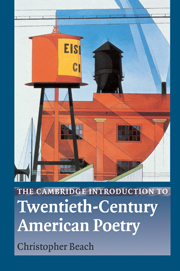Book contents
- Frontmatter
- Contents
- Introduction
- 1 A new century: from the genteel poets to Robinson and Frost
- 2 Modernist expatriates: Ezra Pound and T. S. Eliot
- 3 Lyric modernism: Wallace Stevens and Hart Crane
- 4 Gendered modernism
- 5 William Carlos Williams and the modernist American scene
- 6 From the Harlem Renaissance to the Black Arts movement
- 7 The New Criticism and poetic formalism
- 8 The confessional moment
- 9 Lyric as meditation
- 10 The New American Poetry and the postmodern avant-garde
- Notes
- Glossary
- Index
7 - The New Criticism and poetic formalism
Published online by Cambridge University Press: 05 June 2012
- Frontmatter
- Contents
- Introduction
- 1 A new century: from the genteel poets to Robinson and Frost
- 2 Modernist expatriates: Ezra Pound and T. S. Eliot
- 3 Lyric modernism: Wallace Stevens and Hart Crane
- 4 Gendered modernism
- 5 William Carlos Williams and the modernist American scene
- 6 From the Harlem Renaissance to the Black Arts movement
- 7 The New Criticism and poetic formalism
- 8 The confessional moment
- 9 Lyric as meditation
- 10 The New American Poetry and the postmodern avant-garde
- Notes
- Glossary
- Index
Summary
In the early 1920s, a group of brilliant young poets initiated what would become one of the most important movements in twentieth-century American literature: the New Criticism. The oldest of these poets, John Crowe Ransom, had been teaching at Vanderbilt University in Nashville, Tennessee, since 1914. Along with another Vanderbilt instructor, Donald Davidson, as well as undergraduate students Allen Tate and Robert Penn Warren, Ramsom founded a literary magazine, The Fugitive. The members of Ransom's circle – who contributed both poetry and critical essays to the magazine – called themselves “Fugitives.”
The Fugitives began as a group concerned with producing and publishing good poetry, and their magazine – which ran from 1922 to 1925 – was an important literary publication that included in its pages poems by many of the leading writers of the day. In the course of the decade, however, the focus of the group shifted from the study of poetry to an exploration of the intellectual and artistic problems of Southern writing, and to a still broader examination of the economic and social issues facing the rural South. By 1930 the Fugitives were calling themselves “Southern Agrarians,” and were making the argument that the South's distinctiveness lay in a predominantly agricultural society which stood as a bulwark against the industrial materialism and consumerism of the Northern states. I'll Take My Stand: the South and the Agrarian Tradition (1930) was a collection of essays by twelve Southerners, including Ransom, Davidson, Tate, and Warren.
- Type
- Chapter
- Information
- The Cambridge Introduction to Twentieth-Century American Poetry , pp. 137 - 153Publisher: Cambridge University PressPrint publication year: 2003
- 1
- Cited by

